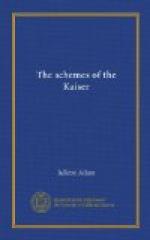These things bring to mind the threat which William II uttered a few days before the fall of Bismarck: “Those who resist me I will break into a thousand pieces.”
March 12, 1891. [4]
The many and varied causes which led to the journey of the Empress Frederick to Paris, and the equally numerous results that the Emperor, her son, expected from that visit, are beginning to stand out in such a manner that we can appreciate their significance more and more clearly. This proceeding on the part of William II, like all his actions, was invested with a certain quality of suddenness, but at the same time, it reveals itself as the result of a complicated series of deliberate plans. The object of these last was, as usual, the young monarch’s unhealthy craving for making dupes. To this I shall return later on. Let us first examine the causes of William’s sudden impulses.
He has acquired, and is teaching his people to acquire, the taste and habit of sudden and unexpected happenings. It having been the habit of Bismarck to speculate on things foreseen, it was inevitable that his jealous adversary should speculate on things unforeseen. Moreover, the King-Emperor is dominated by that law of compensation, from which neither men nor things can escape, and from which it follows logically that Germany, after having profited by methods of continuity, is now condemned to suffer, in the same proportion, her trials of instability.
In determining upon the journey of his august mother to Paris, the Emperor took no risks other than those which pleased him, and which served the purposes of his grudges and his policy. In the first place, this journey would serve for a moment to divert attention in Germany from a policy which the great industrials and the workmen, the party of progress and the conservatives, all unite in condemning. In the next place, Berlin, having for a long time made ready to be amiable to Paris, was bound to resent all the more acutely any failure to reciprocate her kind advances. These results could not fail to be favourable to the vote of credits for military purposes, which are always the last credits asked for by the Government (whether under Bismarck or under Caprivi) and which are always voted under stress of an appeal to the eternal but utterly non-existent dangers, that are supposed to threaten Germany from France.




